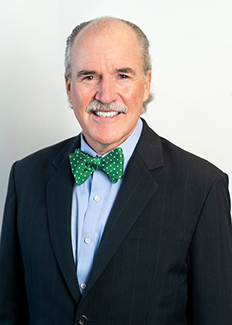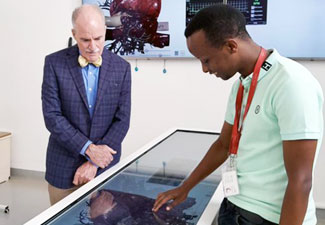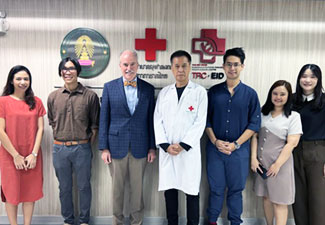Seeing is believing: My year helming the Fogarty International Center
February 8, 2024
 Read recent
blogs and articles from Acting Fogarty Director Dr. Peter Kilmarx. In November, I had the opportunity to see the impact of Fogarty’s efforts during a multi-country trip to Africa, Asia and Europe. My first stop was in Kigali, Rwanda, for the third annual meeting of the NIH Common Fund program,
Harnessing Data Science for Health Discovery and Innovation in Africa (DS-I Africa). This meeting brought together more than 300 data scientists and other researchers from across the continent. A total of 12 NIH institutes, centers, and offices collaborate on DS-I Africa. This broad engagement and scientific diversity are critical to the goals of both Fogarty and the
Common Fund, an internal office at NIH that allows for collaboration on innovative research across institutes and centers. As many readers of this blog already understand, Fogarty is committed to furthering the NIH research mission by establishing collaborations between health research institutions in the United States and other countries as well as nurturing the development of future scientists equipped to tackle global health challenges.
Read recent
blogs and articles from Acting Fogarty Director Dr. Peter Kilmarx. In November, I had the opportunity to see the impact of Fogarty’s efforts during a multi-country trip to Africa, Asia and Europe. My first stop was in Kigali, Rwanda, for the third annual meeting of the NIH Common Fund program,
Harnessing Data Science for Health Discovery and Innovation in Africa (DS-I Africa). This meeting brought together more than 300 data scientists and other researchers from across the continent. A total of 12 NIH institutes, centers, and offices collaborate on DS-I Africa. This broad engagement and scientific diversity are critical to the goals of both Fogarty and the
Common Fund, an internal office at NIH that allows for collaboration on innovative research across institutes and centers. As many readers of this blog already understand, Fogarty is committed to furthering the NIH research mission by establishing collaborations between health research institutions in the United States and other countries as well as nurturing the development of future scientists equipped to tackle global health challenges.
At this DS-I Africa meeting, I felt inspired to see the energy and the rich interactions and to connect with Fogarty trainees and grantees who are leading the effort. The primary criterion for Common Fund programs is to be transformative, and DS-I Africa is certainly shifting Africa’s research landscape as well as leapfrogging scientific and policy barriers to develop solutions of global relevance.
 Photo courtesy of Peter KilmarxA student at University of Global Health Equity, Rwanda, demonstrates an “Anatomage” table while Acting Fogarty Director Peter Kilmarx looks on. While in Kigali, I also visited NIH grant recipients Drs. David Tumusiime and Vincent Sezibera at the College of Medicine and Health Sciences, University of Rwanda. Both are actively involved in DS-I Africa research and training programs. I also spent time with Dr. Gad Murenzi, who directs the Einstein-Rwanda Research and Capacity Building Program in Kigali. With him, I visited an HIV clinic that participates in
IeDEA (International epidemiology Databases to Evaluate AIDS). IeDEA collects observational data representing over 2.2 million people living with HIV in 44 countries and the
Fogarty-IeDEA Mentorship Program (FIMP) trains researchers worldwide using this very large database. Lastly in Rwanda, I met with the Drs. Abebe Bekele, dean, and Daniel Seifu, dean of research, at the University of Global Health Equity. I made a day trip to their beautiful rural campus in Butaro and saw firsthand their state-of-the art facilities. The second-year medical students I spoke with there were eager to learn about global health research opportunities. I took note of their interest in topics ranging from the epidemiology of
H. pylori to the need for palliative care in Africa.
Photo courtesy of Peter KilmarxA student at University of Global Health Equity, Rwanda, demonstrates an “Anatomage” table while Acting Fogarty Director Peter Kilmarx looks on. While in Kigali, I also visited NIH grant recipients Drs. David Tumusiime and Vincent Sezibera at the College of Medicine and Health Sciences, University of Rwanda. Both are actively involved in DS-I Africa research and training programs. I also spent time with Dr. Gad Murenzi, who directs the Einstein-Rwanda Research and Capacity Building Program in Kigali. With him, I visited an HIV clinic that participates in
IeDEA (International epidemiology Databases to Evaluate AIDS). IeDEA collects observational data representing over 2.2 million people living with HIV in 44 countries and the
Fogarty-IeDEA Mentorship Program (FIMP) trains researchers worldwide using this very large database. Lastly in Rwanda, I met with the Drs. Abebe Bekele, dean, and Daniel Seifu, dean of research, at the University of Global Health Equity. I made a day trip to their beautiful rural campus in Butaro and saw firsthand their state-of-the art facilities. The second-year medical students I spoke with there were eager to learn about global health research opportunities. I took note of their interest in topics ranging from the epidemiology of
H. pylori to the need for palliative care in Africa.
My next stop was in Singapore for the annual scientific meeting of the
Global Alliance for Chronic Diseases (GACD). GACD brings together 12 major international research funding agencies specifically to address the growing global burden of noncommunicable diseases in low- and middle-income countries. I was pleased to represent NIH (and the 11 other ICOs that participate in GACD) at GACD's strategy board meeting. With a research network involving hundreds of scientists in more than 70 countries, the meeting was a lively and informative platform to share research findings and network with a global scientific community, including many Fogarty trainees and grant recipients. GACD is very well aligned with Fogarty, as both emphasize implementation research and capacity strengthening.
 Photo courtesy of Peter KilmarxKilmarx met with staff from the Thai Red Cross Emerging Infectious Diseases Health Science Centre at Chulalongkorn University, in Bangkok Thailand, including its director and former Fogarty trainee, Dr. Thiravat Hemachudha (fourth from left in white lab coat), and current Fogarty trainee Dr. Albert To (second from left).
Between meetings, I had a chance to visit Thiravat Hemachudha, director of the Thai Red Cross Emerging Infectious Diseases Health Science Centre at Chulalongkorn University, and Virasakdi Chongsuvivatwong, professor of epidemiology at Prince of Songkhla University in Bangkok, Thailand. Dr. Thiravat is a former Fogarty trainee and now a global leader in research on rabies and other emerging infections, while Dr. Virasakdi is senior infectious disease epidemiologist with a
Fogarty grant to train researchers from Thailand, Burma, and Indonesia.
Photo courtesy of Peter KilmarxKilmarx met with staff from the Thai Red Cross Emerging Infectious Diseases Health Science Centre at Chulalongkorn University, in Bangkok Thailand, including its director and former Fogarty trainee, Dr. Thiravat Hemachudha (fourth from left in white lab coat), and current Fogarty trainee Dr. Albert To (second from left).
Between meetings, I had a chance to visit Thiravat Hemachudha, director of the Thai Red Cross Emerging Infectious Diseases Health Science Centre at Chulalongkorn University, and Virasakdi Chongsuvivatwong, professor of epidemiology at Prince of Songkhla University in Bangkok, Thailand. Dr. Thiravat is a former Fogarty trainee and now a global leader in research on rabies and other emerging infections, while Dr. Virasakdi is senior infectious disease epidemiologist with a
Fogarty grant to train researchers from Thailand, Burma, and Indonesia.
For my final stop, I joined 130 experts from 43 countries in the first
Global Clinical Trials Forum at the headquarters of the World Health Organization (WHO) in Geneva convened by its Chief Scientist Dr. Jeremy Farrar. I’ve been keenly interested in the need to build global clinical trial capacity to address countries’ perennial health challenges that can also be available in the event of infectious disease outbreaks or other health emergencies.
January 2024 marks the one-year anniversary of my role as acting director of Fogarty and, with that, acting associate director for international research for NIH. My trip, which included stops in Africa, Asia and Europe, was an outstanding opportunity to represent Fogarty and all of NIH in key international fora, to promote global health research partnerships, and to see firsthand the impressive impacts of our exceptional Fogarty team. NIH is truly a global enterprise with strong connections and ongoing critical programs in research and training around the world. It’s been a privilege to serve in this role, and I enter the new year as energized and optimistic as ever about our progress toward achieving our vision of a world in which the frontiers of health research extend across the globe and advances in science are implemented to reduce the burden of disease and promote health for all people.
More Information
Updated February 7, 2024
To view Adobe PDF files,
download current, free accessible plug-ins from Adobe's website.
Related World Regions / Countries